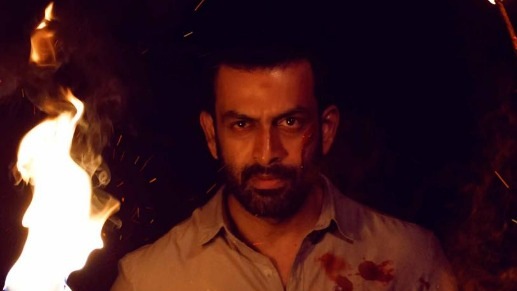Kuruthi movie review: Prithviraj’s socio-political thriller is fuelled by stellar performances and writing
Right from the start, the script builds up its characters – giving each of them a dimension that the makers then cleverly use to propel the story forward, while holding a mirror to the current socio-political scenario in Kuruthi, which is streaming on Amazon Prime Video

Last Updated: 12.00 AM, Aug 11, 2021
Story: After a cop barges into the house of Ibrahim and his family with a culprit and seeks their help against Laiq, a ruthless man seeking revenge for his father’s murder, God-fearing Ibrahim’s beliefs are put to test. Will he be able to keep his word and protect the murder accused or will Laiq get his vengeance?
Review: Be it 9 or Lucifer, the Mollywood actor Prithviraj Sukumaran’s recent thrillers have been peppered with Biblical references and analogies. In Kuruthi, which is directed by Manu Warrier and written by Anish Pallyal, these metaphors reinforce the relevant core theme of the movie – the raging fire of hatred burning bridges between brothers.
In the potent teaser of the film that was released in April, Mamukkoya’s character Moosa speaks of how a spark of hatred is enough to ignite a fire that keeps raging till it consumes the very person. Kuruthi opens with Ibrahim (Roshan Mathew), a God-fearing man who has endured a painful past. He stays with his father Moosa and brother Resul (Naslen), while siblings Sumathi (Srinda) and Preman (Manikandan Achari) are their neighbours. One night, a cop (Murali Gopy) barges into their house with a youngster (Sagar Surya) arrested for murder and seeks protection from Laiq (Prithviraj), a bloodthirsty man seeking vengeance for the murder of his father. Fueling the latter’s anger is the fact that the one who committed the act is from another community. Will Ibrahim be able to protect those who sought shelter in his home or will Laiq avenge the death of his father?
About 60% of the film is set in and around a house, which in itself seemingly reflects the current society, with strangers breaking in, sowing seeds of doubt, manipulating each other and twisting their intentions. Right from the start, the script builds up its characters – giving each of them a dimension that the makers then cleverly use to propel the story forward, while holding a mirror to the current socio-political scenario. In a scene when Kammu (Shine Tom Chacko) tries to appeal to Ibrahim to open the door, he is interrupted by Sumathi, quickly drawing the ire of Laiq, who furiously asks what role does a woman have when men are talking. Laiq then tries to appeal to Ibrahim’s faith, making him doubt whether he is right or wrong, to side with his community or what he believes is right. This sequence alone leaves several layers to infer from and poses multiple questions – not just for Ibrahim but the discerning viewers too.
The writing packs so much information, in the most subtle and metaphorical manner. For instance, when the house is plunged into darkness by those trying to break in, the youngsters inside the house immediately take up arms against each other, as they don't trust themselves even when the real danger is outside. But the film is not without its faults, there are portions when the writing does become preachy and sometimes a tad insensitive too, for instance, when the youngster talks about the reservation of minority communities. But that can be overlooked, given it’s shown as coming from a youth who doesn’t value dissent and this is expressed in a succinct conversation between Sagar and Mammukoya’s characters. While dialogues about hatred reinforces the story and demarcates Laiq and Ibrahim’s beliefs, they do become redundant over time when Moosa keeps quoting references from the religious scriptures.
Prithviraj as Laiq is brilliant. He lends a sinister presence right from the moment he is shown on screen and successfully sustains it till the end, excelling at it during the conversation when he compares taking a person’s life to that of sacrificing a lamb. Roshan Mathew as the doubting, devout Ibrahim once again proves that he is capable of acing any character he is dealt with. His melancholic expressions in the first half bring alive his suffering while his hesitancy reflects the test of faith he endures as the movie progresses.
Mamukkoya gets the film’s best punchlines and also its weighty dialogues, and the actor more than lives up to it with one of his best performances. Both Sagar Surya and Naslen as Vishnu and Resul give the experienced counterparts a run for their money with their mature portrayals. Srinda, Shine Tom Chacko, Navas Vallikunnu, Murali Gopy and Manikandan Achari - all play their roles well and credit to makers for ensuring each character was a vital cog in the film, which tackles its theme engagingly. The casting is spot on in Kuruthi.
Most of Kuruthi is set at night. Though at times it does feel a bit like a pandemic-enforced chamber film, cinematographer Abhinandan Ramanujam’s visuals keep the sombre and tense tone of the film. This is aided skillfully by Jakes Bejoy’s music and excellent tracks that elevate the intensity of the movie, crisply edited by Akhilesh Mohan.
Verdict: Prithviraj, Roshan Mathew and the rest of the cast of Kuruthi outperform each other in this brave, relevant and engaging socio-political thriller that will reveal more layers with repeated watch.
Subscribe to our newsletter for top content, delivered fast.

